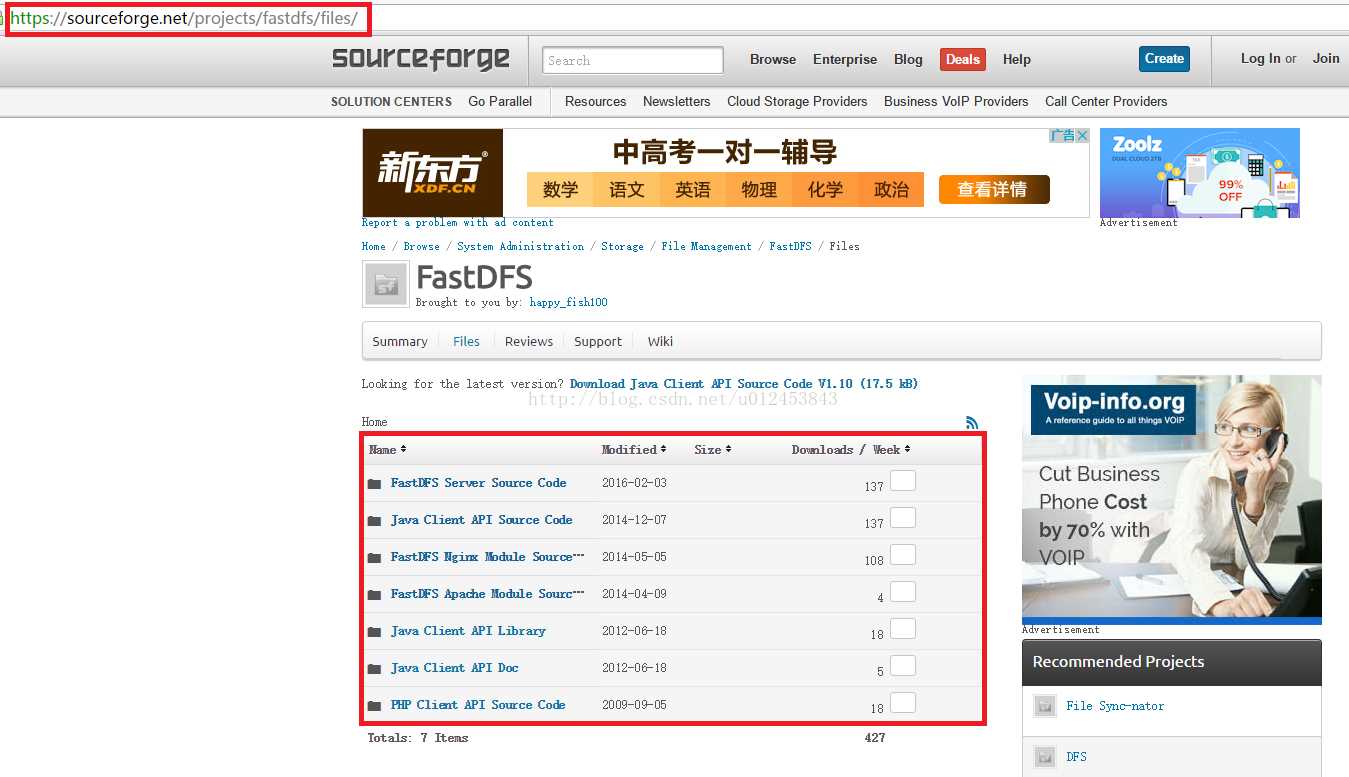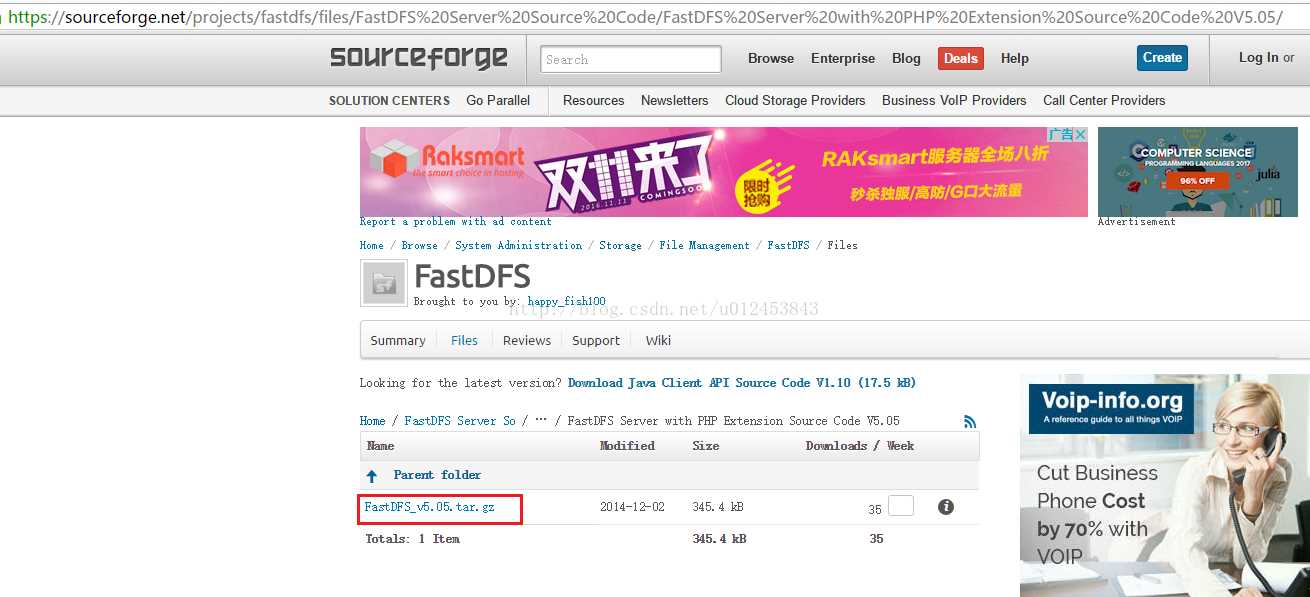本文主要介绍在linux服务器如何搭建FastDFS文件服务器。大概分为9个步骤,由于内容较为繁琐。下面带你入坑!
首先简单介绍一下FastDFS是淘宝资深架构师余庆老师主导开源的一个分布式文件系统,用C语言编写。适应与中小企业,对文件不分块。
主要有Tracker(管理) 和Storage (储存)。
返回路径= 组名 /虚拟盘符{M00/00/02} /文件名

下面是安装FastDFS的安装包
第一步:大家在浏览器地址栏输入:https://sourceforge.net/projects/fastdfs/files,我们会看到如下图所示界面。

第二步:下载FastDFS的Server安装包,我们点击上图"FastDFS Server Source Code",会看到如下图所示界面,我们选择2014-12-02那个版本,因为这个版本是最稳定的版本。

第三步:我们会看到如下图所示界面,我们点击"FastDFS_v5.05.tar.gz"进行下载即可。

下面是下载好的

或者是自己下载
wget https://github.com/happyfish100/libfastcommon/archive/V1.0.7.tar.gz wget http://jaist.dl.sourceforge.net/project/fastdfs/FastDFS%20Nginx%20Module%20Source%20Code/fastdfs-nginx-module_v1.16.tar.gz wget https://github.com/happyfish100/fastdfs/archive/V5.05.tar.gz wget http://nginx.org/download/nginx-1.12.1.tar.gz
检查系统是否有安装GCC
gcc –version
安装GCC
yum -y install gcc gcc-c++ autoconf pcre pcre-devel make automake yum -y install wget httpd-tools vim
就把gcc当成c语言编译器, g++当成c++语言编译器用就是了.(知乎)
进入libfastcommon压缩包目录解压,编译,安装
tar -zxvf libfastcommonV1.0.7.tar.gz
进入解压的libfastcommon-1.0.7目录,编译
./make.sh
安装
./make.sh install
最后,libfastcommon.so文件到usr/lib下 ,请按照自己的实际文件路径修改被复制路径
cp /data/fastDFS/software/libfastcommon-1.0.7/src/libfastcommon.so /usr/lib
解压FastDFS_v5.05.tar.gz,然后编译安装FastDFS
tar -zxvf FastDFS_v5.05.tar.gz ./make.sh ./make.sh install
安装成功后将目录conf内的文件拷贝到/etc/fdfs目录下:
cp /data/fastDFS/software/FastDFS/conf/* /etc/fdfs/
进入/etc/fdfs目录,修改tracker.conf文件。如果不存在,就拷贝tracker.conf.sample文件为tracker.conf,然后再修改:
base_path=/home/yuqing/fastdfs >>> base_path=/home/logs/fastdfs (注解:日志文件) http.server_port=8080 >>> http.server_port=80 (注解:端口,80是方便默认) store_group=group1 (注解:组名)
其中,/home/
logs
/fastdfs目录如果不存在,就创建一个。
之后,就启动tracker,并查看是启动成功(出现如下提示,表示启动成功):restart重启
fdfs_trackerd /etc/fdfs/tracker.conf start netstat -unltp | grep tracker

由于storage和tracker运行的都是fastDFS程序,每一台服务器都部署一台fasfDFS,一台服务器是tracker,一台是storage
修改storage.conf文件。如果不存在,就拷贝storage.conf.sample文件为storage.conf,然后再修改:
base_path=/home/yuqing/fastdfs >>> base_path=/home/logs/storage (日志路径) store_path0=/home/yuqing/fastdfs >>> store_path0=/home/data/storage (实际储存文件路径,可以配置多个) tracker_server=192.168.209.121:22122 >>> tracker_server=192.168.2.231:22122 (连接tracker服务器地址) group_name=group1 (必须和tracker的组名相同)http.server_port=80 (这个端口也要改)
其中,如果/home/logs/storage和/home/data/storage不存在,就创建该目录
然后,就启动storage,并查看是否成功(出现如下提示,表示启动成功):
fdfs_storaged /etc/fdfs/storage.conf start netstat -unltp | grep storage

最后,查看tracker和storage是不是在通信:
fdfs_monitor /etc/fdfs/storage.conf
如下提示,出现ACTIVE,表示二者均正常启动,至此就可以进行上传文件测试了。

Tracker和storage都已经安装完成,使用命令测试文件上传:
FastDFS提供一个文件上传命令:usr/bin/fdfs_test 测试文件上传。测试上传需要连接tracker服务器,连接storage服务器。因此需要指定一个配置文件:client.conf配置文件,通过Client.conf连接tracker服务器。
修改/etc/fdfs下client.conf
base_path=/home/logs/client (日志目录) tracker_server=192.168.2.231:22122 (tracker端口)
测试命令
/usr/bin/fdfs_test /etc/fdfs/client.conf upload anti-steal.jpg
如下图返回地址则成功

安装Nginx所需的其他环境,gcc在上面装过了。本人安装没走这一步
#gcc安装 yum install gcc-c++ #PCRE pcre-devel 安装 yum install -y pcre pcre-devel # zlib 安装 yum install -y zlib zlib-devel #OpenSSL 安装 yum install -y openssl openssl-devel
解压、编译、安装。
tar -zxvf nginx-1.12.1.tar.gz cd nginx-1.12.1 ./configure make make install
首先解压fastdfs-nginx-module_v1.16.tar.gz,修改/fastdfs-nginx-module/src/config文件。去掉所有的local(三个)

拷贝usr/lib64目录下库文件libfdfsclient.so
cp /usr/lib64/libfdfsclient.so /usr/lib
在nginx安装目录下执行如下命令:把module添加nginx中。通过设置安装参数方式添加模块。
cd nginx-1.12.1 ./configure --add-module=../fastdfs-nginx-module/src
注意:我这里nginx-1.12.1和fastdfs-nginx-module在同一级目录,所以这样写

重新安装编译
make && make install
查看Nginx的模块
/usr/local/nginx/sbin/nginx -V
复制 fastdfs-nginx-module 源码中的配置文件到/etc/fdfs 目录, 并修改
cd fastdfs-nginx-module/src cp mod_fastdfs.conf /etc/fdfs/
进入/etc/fdfs/修改mod_fastdfs.conf如下配置,其他默认
# 连接超时时间 connect_timeout=10 # Tracker Server tracker_server=192.168.2.231:22122 # StorageServer 默认端口 storage_server_port=23000 # 如果文件ID的uri中包含/group**,则要设置为true url_have_group_name = true # Storage 配置的store_path0路径,必须和storage.conf中的一致 store_path0=/home/data/storage # the base path to store log files base_path=/home/logs/storage
配置iNginx ,进入/usr/local/nginx/conf目录下修改nginx.conf
注意:无论你在哪解压安装的。必须进这个目录/usr/local/nginx/conf下修改nginx.conf
vim nginx.conf
修改配置,其它的默认
在80端口下添加fastdfs-nginx模块
location ~/group([0-9])/M00 {
ngx_fastdfs_module;
}
注意下面#user nobody;改成 #user root;
#user nobody;
worker_processes 1;
#error_log logs/error.log;
#error_log logs/error.log notice;
#error_log logs/error.log info;
#pid logs/nginx.pid;
events {
worker_connections 1024;
}
http {
include mime.types;
default_type application/octet-stream;
#log_format main '$remote_addr - $remote_user [$time_local] "$request" '
# '$status $body_bytes_sent "$http_referer" '
# '"$http_user_agent" "$http_x_forwarded_for"';
#access_log logs/access.log main;
sendfile on;
#tcp_nopush on;
#keepalive_timeout 0;
keepalive_timeout 65;
#gzip on;
server {
listen 80;
server_name 192.168.2.231;
location ~/group([0-9])/M00 {
ngx_fastdfs_module;
}
#charset koi8-r;
#access_log logs/host.access.log main;
location / {
root html;
index index.html index.htm;
}
#error_page 404 /404.html;
# redirect server error pages to the static page /50x.html
#
error_page 500 502 503 504 /50x.html;
location = /50x.html {
root html;
}
# proxy the PHP scripts to Apache listening on 127.0.0.1:80
#
#location ~ \.php$ {
# proxy_pass http://127.0.0.1;
#}
# pass the PHP scripts to FastCGI server listening on 127.0.0.1:9000
#
#location ~ \.php$ {
# root html;
# fastcgi_pass 127.0.0.1:9000;
# fastcgi_index index.php;
# fastcgi_param SCRIPT_FILENAME /scripts$fastcgi_script_name;
# include fastcgi_params;
#}
# deny access to .htaccess files, if Apache's document root
# concurs with nginx's one
#
#location ~ /\.ht {
# deny all;
#}
}
# another virtual host using mix of IP-, name-, and port-based configuration
#
#server {
# listen 8000;
# listen somename:8080;
# server_name somename alias another.alias;
# location / {
# root html;
# index index.html index.htm;
# }
#}
# HTTPS server
#
#server {
# listen 443 ssl;
# server_name localhost;
# ssl_certificate cert.pem;
# ssl_certificate_key cert.key;
# ssl_session_cache shared:SSL:1m;
# ssl_session_timeout 5m;
# ssl_ciphers HIGH:!aNULL:!MD5;
# ssl_prefer_server_ciphers on;
# location / {
# root html;
# index index.html index.htm;
# }
#}
}
注意:
listen 80 端口值是要与 /etc/fdfs/storage.conf 中的 http.server_port=80 (前面改成80了)相对应。如果改成其它端口,则需要统一,同时在防火墙中打开该端口。
location 的配置,如果有多个group则配置location ~/group([0-9])/M00 ,没有则不用配group。
在文件存储目录下创建软连接,将其链接到实际存放数据的目录,注意这个文件存储的位置后面多个data目录是系统自动生成的
ln -s /home/data/storage/data /home/data/storage/data/M00
启动nginx
#启动nginx cd /usr/local/nginx/sbin/ ./nginx 直接启动/usr/local/nginx/sbin/nginx #设置开机启动 vim /etc/rc.local /usr/local/nginx/sbin/nginx # 设置执行权限 chmod 755 rc.local
查看Nginx是否启动
ps -ef | grep nginx
OK记得云服务的安全组 和防火墙设置需要方通 80、22122、 23000 这个不会的请参考腾讯云服务器tomcat端口无法访问 中的防火墙设置
在地址栏中访问成功 http://192.175.231.128/group1/M00/00/00/rBAACVzBeU2AQBKJAAOHDqS1H9o350.jpg

报错!不存在的。有问题110,120,119
注意:
1.group2同组的Storage2和Storage3 FastDFS服务端口必须一致: port=23000。
2.一台服务器可以装多个组(group)但不能装同组的多个Storage,日志会报错误,日志报错原因是"注意1"
3.Version 4.05之前fastdfs内部绑定了libevent作为http服务器.Version 4.05之后的版本删除了内置的web http服务,内置的web http服务是个累赘,不用也罢!
4.启动storage server时,一直处于僵死状态.启动storage server,storage将连接tracker server,如果连不上,将一直重试。直到连接成功,启动才算真正完成!如果集群中有2台tracker server,而
其中一台tracker没有启动,可能会导致storage server一直处于僵死状态。
到此这篇关于linux搭建FastDFS文件服务器的实现步骤的文章就介绍到这了,更多相关linux搭建FastDFS文件服务器内容请搜索脚本之家以前的文章或继续浏览下面的相关文章希望大家以后多多支持脚本之家!